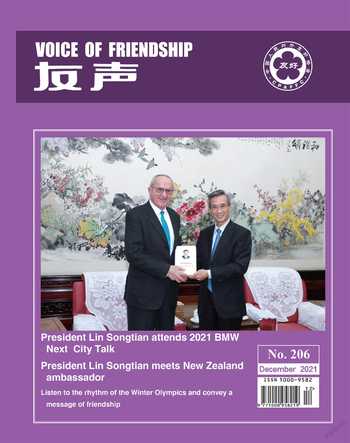The Belt and Road Initiative:A basis for a new international order
2021-01-22SmailDebeche
Smail Debeche
B efore President Xi Jinping introduced the Belt and Road Initiative in 2013, China had already successfully and peacefully attained scientific and economic development for its 1.4 billion people, or about 25 percent of the global population.
The world should recognize China’s achievements and respect its national unity and stability. China should be hailed as a model of development. This model is a great contribution to an alternative world system that has value for all, a sharing world guided by five core principles: mutual respect for sovereignty and territorial integrity, mutual nonaggression, non-interference in internal affairs, equality and mutual benefit and peaceful coexistence.
The historical experience of the Silk Road more than 2,000 years ago inform the Belt and Road Initiative concepts and dimensions in the 21st century — coordinating states’ policies for land routes, railways, airports, dams, sea routes, ports, reduction of customs and trade barriers, financing of infrastructure and trade connectivity. All aim at increased trade volume and exchanges of culture, science and people, are constructive in nature, civic in character, human in objective and with meaningful new opportunities guided by mutual benefit and dimensions in the wake of exploitative policies and actions by Western imperialism or Western neoimperialism as a whole and by the United States in particular.
Within such content, the Belt and Road Initiative can serve as a viable alternative, even for Europe, in escaping from US pressure and blackmail politics. The initiative is a major link for European and Asia Pacific economies, providing great opportunities and benefits to promote China-EU relations based on win-win cooperation.
The original aim of the Belt and Road Initiative was to promote the connectivity of Asian, European and African continents and their adjacent seas, establish and strengthen partnerships among countries along the routes, set up all-dimensional, multitiered and composite connectivity networks and realize diversified, independent, balanced and sustainable development in these countries.
The timing of the Belt and Road Initiative coincides with the gradual and globally progressing rejection of the unipolar world led by the US. Such unilateralism is resented even by Washington’s allies in Europe, not to mention developing countries. The latter’s governments under escalating pressures on their own people are heading for adopting policies and taking actions outside the Western orbit. The Western world system is shrinking, giving way to a balanced and multipolar international order.
Outside the West, the world is already witnessing new emerging alternative poles, especially China as a great world economic and industrial power and Russia as a major technological and military power. This is coupled with independent foreign policies. Thus, both powers together can take the lead toward a multipolar world order.
The West is no longer the dominant source of technology and industry. Western countries themselves are a market for the Chinese economy. The coronavirus pandemic has confirmed the fragility and failure of the Western health system, and many other fields in the West may face the same destiny in coming years.
Human nature and the soft approach reflected in the civic pragmatism of the BRI suggests a promising initiative for an alternative to the existing international order beyond those of the current world system, which is full of wishful thinking, promises (democracy, freedom, human rights), far from being meaningful or realizable.
Western forces are rushing to reinforce the existing international order, rules and conditions, which are imperialist in nature, including creating crises and conflicts among nations in obtaining Western financial and economic interests — of course at the expense of the vast majority of peoples and states.
So far, the international system has been imposed on the world by Western domination. The vast majority of the countries did not exist when the international system was shaped by two world wars and their aftermath. Through the Belt and Road Initiative, which is peaceful in nature, along with other contributions, the time is ripe for a new international order or a multipolar world to replace the existing system of imperialist domination and US blackmail politics derived from international military crises and war.
(The author is president of the Algeria-China Friendship Association.)
杂志排行
Voice Of Friendship的其它文章
- The Seagulls of Salt Lake City:Helen Foster Snow and China
- Overseas students from Peking University visit Xinjiang
- Listen to the rhythm of the Winter Olympics and convey a message of friendship
- A review of exchanges between Baoji and ROK in 2021
- 2021 GD Youth Link:3rd Guangdong International Youth Sports Dialogue held in Guangzhou
- Pacific China Friendship Association members issue joint statement to the WHO opposing politicization and stigmatization in COVID-19 origin-tracing
